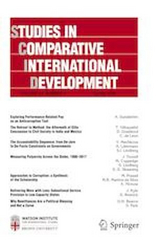
Constellations of fragility: an empirical typology of states
Ziaja, Sebastian / Jörn Grävingholt / Merle KreibaumExternal Publications (2019)
in: Studies in Comparative International Development 54 (2), 299-321
DOI: https://doi.org/10.1007/s12116-019-09284-3
Volltext/Document


